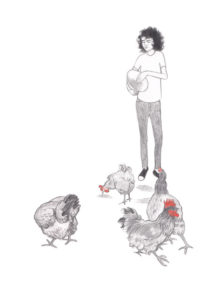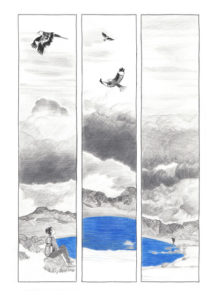Skinheads were everywhere in Seventies Leeds. Credit: Michael Daines /Mirrorpix/Getty
“Growing up between Leeds and Bradford in the Seventies, everyone at my school seemed to be, at best, a casual racist and, at worst, an active member of the NF.”
Una, the graphic novelist and artist, grew up in the same world I did. I spent my youth in a small, white town in the northeast during a deep economic recession; the only work available was in a very gloomy factory, 20 miles away. Racism was creeping and insidious. The National Front would recruit by standing outside our sink school and handing out leaflets, with headlines about immigrants “taking the jobs” of white men.
Most of the young blokes in the neighbourhood became skinheads, the few Asian families who lived there constantly attacked. After they learned I was a lesbian, I was targeted by the skinheads too. Walking to the shops on our council estate was deeply unpleasant as I was fearful I might bump into groups of young men, looking for distraction from the boredom and poverty.
Even the boys who defended me against the thugs frightened me. I was reminded of all this when I read Eve, new graphic novel by author Una, which though ostensibly about the climate crisis, also considers Right-wing populism and Left-wing authoritarianism. In her book the anti-fascists deployed the same tactics as the racists — just as I remembered from my own experience, and just as we’re seeing today.
I picked Eve up because I had so loved Una’s previous book, Becoming Unbecoming, all about experiencing sexual exploitation at the same time that the Peter Sutcliffe’s psychological cosh was terrorising young women. That book spoke to me because I came of age in the same time and place that Sutcliffe mutilated and killed six of his 13 victims.
The new book is also set up North, in a town similar to Keighley. It has a beautiful landscape, a diverse population — and a lot of tension. But this time it is set in the future. It is, Una tells me, about her worries for her children and the next generation. “It’s hard to talk to my own kids because I don’t feel optimistic for them,” she says. And so she funnelled all those worries into the book.
It is all pretty abstract. But if there is a story, it is about how a young girl and her family cope as society slides into totalitarianism. Their world is in turmoil, something we can relate to in our current angry political moment; and the family fears feel familiar — like something we’re about to experience ourselves. Following some sort of life-changing catastrophe, Eve leaves her community and sets off alone to seek a new way to live.









Join the discussion
Join like minded readers that support our journalism by becoming a paid subscriber
To join the discussion in the comments, become a paid subscriber.
Join like minded readers that support our journalism, read unlimited articles and enjoy other subscriber-only benefits.
SubscribeJulie, I wish very much, every time I read an article like yours – the writer tells us WHY the government felt changing the racial makeup of the cities was the thing to do.
Then Why did they bring in low skilled who will exactly compete with the locals who are hard pressed for work allready? Why – was is good? Did it achieve some plan? If so what?
I was from London in the 1970’s, a middle class area, but you know London, the next town over is likely not. My people were more the Bikers and rockers, and when I return to the old place all the people I knew then have been price gentrified out, have left the area. They could never afford the houses they grew up in. But what is Really Odd is the people living in those houses are mostly old people, and people from very different places, who are NOT prosperous themselves.
Somehow the people who were from there have been priced out, to be replaced by others who are not very prosperous themselves – Why? How? London is now less than 49% native British – why? Was this voted on? People being squeezed out tend to resist, they lose, but may resist during the process….
So Leeds? Do you know the Mirpuri Migration? “More than half a million Mirpuri people, originally from Pakistan-administered Kashmir now live in England. Mirpuri immigrants in the UK are primarily located in Yorkshire. ” Google the study on this…. Tell us how this effected the locals – brought in to work the mills which then closed…..
Get over this “In the war between fas* ists and anti-ra* ists”, where I would call them right wing and Fas* ists (what are called anti-fas* ists are just really fas* ists), but I would also NOT judge the PAST by the Present when it WAS A DIFFERENT TIME then, the whole world was different.
“This was 50 years ago. And, yet, we can see the same flames being fanned today.” YES WE Do see the fanning, it is what today in the West is all about, and articles like this are very much part of this. The past was a different time, place. land, people, society…
Sorry you had a hard time growing up, but having seen a great deal of the world, this is not unusual, I have seen lands where people are starving, terrified of gangs, of the utterly corrupt police, of every kind of horror of poverty – it is hard out there, and 50 years ago was even more so.
There has been a great deal of incremental change since the 70’s, some of it good. More equality seems to mean more need to distinguish yourself from the mass,the flip side to that is alienation. There will always be extremists looking to leverage your pain and disillusionment. Social media is perfect for that, as is economic turmoil.
Writing novels, drawing, feeding chickens and finding someone to love is a good defence. The seventies were a particularly nasty, violent decade, but I do remember a lot of simple happiness too. On one level there seemed more cohesion, even in opposition. WW2 was only 30 years earlier and its shadow was long, the older generation looked on in amazement at the hedonism and felt it a very strangely won freedom. I grew up with Uncles who had suffered on Arctic convoys and in Japanese prisoner of war camps and spent time in and out of hospitals. They had no time for NF or Socialist worker, regarding them with equal contempt. But an allotment, piece of cake and a cup of tea, that was worth fighting for.
Just a thought, Julie, but have you ever considered that Labour is NOT the solution to the world’s problems?
Be fair. She thinks the solution to racism is sexism.
Where in the article did you get the impression that Julie has anything like a sanguine view of Labour?
Well, Julie is an old Guardian War-horse columnist, as many of the Unhers’s stable of writers are – and so my guess is when she hears the trumpets of the Old Labour call she feels a frisson of the old class war battle excitement.
You’re right, I think, that many UnHerd regulars retain a sense of class politics, and class insult, especially if they, like Julie, actually experienced it in their lives. But Labour has so uncoupled itself from the working class issues that they’ve driven away people like Giles Fraser. As for Julie, well, I don’t know but I’d imagine if she votes Labour it’s with no enthusiasm and few expectations.
EVERYONE in our society has the right to live WITHOUT fear and express their views WITHOUT being abused. The left now seem to be against such wisdom and as a result the Labour Party is becoming less relevant by the day.
What?
There’s something you don’t hear every day.
‘accusations of homophobia and bigotry have been targeted towards young Asian men, and the white, openly lesbian Labour candidate, Kim Leadbeater, has been aggressively challenged on her position on the Middle East conflict’. You couldn’t get a better example of disingenuous evasion than this.
See, I have questions.
How did Julie even know that lesbian was a thing as a young’un?
La Wik says Julie grew up on a council estate. Was her family about the only middle-class family around? Or what? Based on my experience as a middle-class young’un in Britland before Julie’s time, I would have steered clear of all working-class lads. Just to be safe.
On my website ukpublicspending.co.uk it says that UK public spending was just short of 40% percent of GDP from 1960 to 1980. the years of Julie’s youth. You think maybe that a c**k-up or two on the public spending and industrial policy and ruling-class ideology front was responsible for all those skinheads?
See, I’m one of those notorious racist-sexist-homophobes of whom you’ve heard tell. And I think that “social” means people collaborating in non-governmental social organizations. If you have government running 40 percent of the economy, you do not have social. You have 40 percent of everything is force.
So you’d expect anti-social skinheads. That’s the whole point of politics, to get people riled up. Back in the day, the Labour Party thing was ginning up class conflict. Now they do racial conflict and gender conflict. Hey, politics is division, and politicians are the dividers-in-chief.
Sorry to be such a bigot and a fascist.
Skinheads were few in number and located in a few areas. Vast parts of Britain were skinhead free. Those who had seen combat in WW2 had not time for their puerile actions, especially those who risked torture and execution if caught.